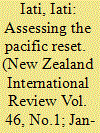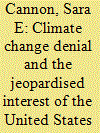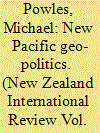| Srl | Item |
| 1 |
ID:
179170


|
|
|
|
|
| Summary/Abstract |
Most observers of Pacific geopolitics assume that one of the key purposes of the Pacific Reset is to counter China's influence in the Pacific. We have had conflicting messages from the government, some directly disputing this assumption. From an outsider's perspective, however, both the narrative and policies surrounding the reset point to no other conclusion than that a key goal is to counter China.
|
|
|
|
|
|
|
|
|
|
|
|
|
|
|
|
| 2 |
ID:
180647


|
|
|
|
|
| Summary/Abstract |
The Compacts of Free Association (COFA) are agreements between the United States of America and three Pacific Island countries: the Republic of the Marshall Islands (RMI), the Federated States of Micronesia (FSM) and Palau, collectively the Freely Associated States (FAS). COFA provides the FAS financial assistance to build their economies and foster financial independence; in exchange, the United States has regional military control. The United States is the world's second largest emitter of greenhouse gases, while the FAS produce few emissions but are vulnerable to climate impacts. I highlight inconsistencies in U.S. policies from within its own paradigm by ‘seeing like an empire’ to show how contradicting priorities jeopardise American interests in the region. Aid provided by COFA has done little to build infrastructure supporting the FAS's economically independence, and climate change diverts economic resources to funding climate adaptation. The United States is currently battling China to maintain hegemony in the Pacific, making the FAS strategically important for national security. Meanwhile, climate change threatens U.S. military installations in the FAS. It is in the United States' best interests to limit emissions to protect its investments in the FAS, but this requires a policy change to prioritise its commitments in Micronesia over climate change denial.
|
|
|
|
|
|
|
|
|
|
|
|
|
|
|
|
| 3 |
ID:
129342


|
|
|